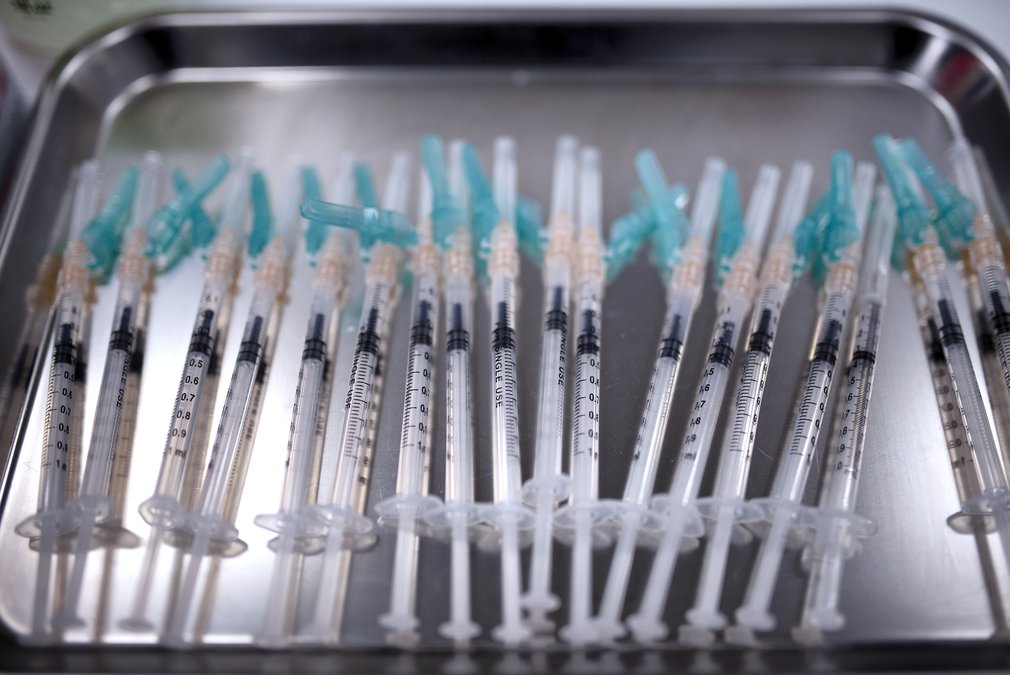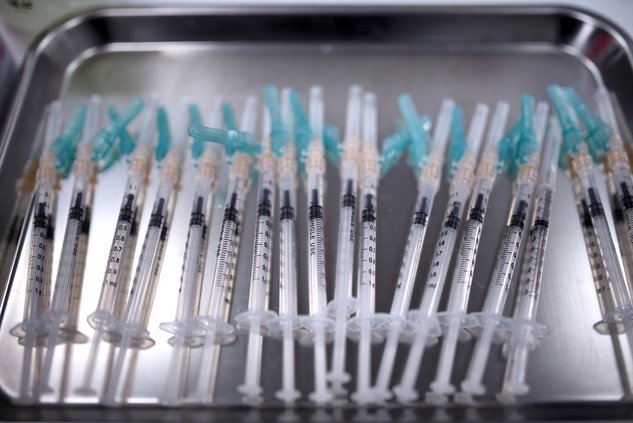The Northeast Georgia Health System is sponsoring coverage directly related to public safety so that it can be made available free to non-subscribers as a public service. News coverage is independently reported. We know that you need accurate and up-to-date information about the effects of the coronavirus in the state and our region. Please consider supporting our work by subscribing to The Times.
Northeast Georgia Health System officials and District 2 Public Health Director Dr. Zachary Taylor gathered virtually Tuesday, Feb. 23, to discuss the myths and truths swirling around the COVID-19 vaccine.
The event, called “Myth Busting: COVID-19 Vaccines,” was sponsored by the Greater Hall Chamber of Commerce to answer community questions. The Zoom webinar comes at a time in Hall County when hospitalizations are decreasing and more than 11,000 vaccine doses have been administered to the community by NGHS.
As of Tuesday, the seven-day rolling average of positive tests for NGHS was 8.86%. This is down considerably from the peak seen at NGHS, which was 35.79% on Jan. 8.
There were 115 confirmed COVID-19 positive patients Tuesday across the NGHS facilities with another 36 patients awaiting test results. Jan. 8 was the peak for patients as well when NGHS was treating 355 COVID-19 patients.
“We were scrambling at that point to keep everybody taken care of,” said Dr. John Delzell, NGHS incident commander, of the Jan. 8 peak.
There have been 902 COVID-19 deaths at NGHS since the pandemic began.
NGHS has now administered more doses in the community compared to the health system’s employees. There were 10,774 total doses of either the first or second shot given to NGHS employees and 11,566 doses given to the community through NGHS, its long-term care facilities and Northeast Georgia Physicians Group.


Who is next in line for the vaccine
The most common question coming to state leaders and District 2’s Taylor has been: When will the next phase of the rollout start?
Taylor said he believes the move into the 1B phase, which has been described as critical infrastructure employees and others at high risk, may be sometime in March.
The decision ultimately is up to Gov. Brian Kemp and the Department of Public Health.
These critical infrastructure employees would likely be teachers, food producers, utility workers and more, though the state has not provided clarification.
When the new phase does begin, Taylor said it may be that not all groups will go at once.
“It’s easier for us to do this in chunks instead of trying to respond to the demands of all these different groups,” he said.
When asked if the general public would become eligible by May, Taylor said it was a possibility that would depend heavily on the vaccine supply and the time it takes to finish these prior phases.
“I want people to recognize once we get through all the critical infrastructure workers and the people with medical conditions that put them at greater risk, we’re talking about a significant amount of the population,” he said. “Once we get through them, we’re probably halfway there to having the population fully vaccinated.”
Taylor said he does not believe the move to the general public will come later than the end of June.
The advantages of the Johnson & Johnson vaccine
Taylor also fielded questions on the vaccine version being produced by Johnson & Johnson, which is expected to get the green light from regulators soon.
The Biden administration said Tuesday that it expects about 2 million doses of that vaccine to be shipped in the first week, but the company told lawmakers it should provide enough of the single-dose option for 20 million people by the end of March.
Taylor said it has some distinct advantages including that it is only one shot and can be stored with simple refrigeration, which makes it easier to distribute.
In U.S. trials, however, the efficacy rate was 72% for the Johnson & Johnson vaccine. The Centers for Disease Control and Prevention said the two-dose Moderna vaccine was 94.1% effective and the two-dose Pfizer vaccine was 95% effective based on the evidence from clinical trials.
“It is perhaps less effective in preventing COVID-19 disease, but it is very effective in preventing severe COVID-19 hospitalizations,” Taylor said.
Looking ahead to summer, Pfizer and Moderna expect to complete delivery of 300 million doses each, and J&J aims to provide an additional 100 million doses. That would be more than enough to vaccinate every American adult, the goal set by the Biden administration.
Nearly 14% of Americans have received at least an initial dose of the two-shot-regimen vaccines from Pfizer and Moderna.
Taylor said he believes people should have the choice and pick the vaccine that is best for them and their circumstances.
What to do after you’ve been vaccinated
People are considered to have immunity one week after taking the Pfizer vaccine’s second dose and two weeks after the Moderna vaccine second shot.
“If you are fully immunized and you are exposed (to COVID), you do not have to quarantine,” Taylor said. “Regardless of whether you’ve been exposed to someone or not, we recommend that you wear a mask when you’re in public, that you continue to socially distance and that you avoid large gatherings. The reason for that is that we’re not quite sure whether or not the vaccine fully prevents someone from being infected.”
This means a person could still spread it to others unknowingly while being asymptomatic.
For those who have been vaccinated, the officials said it would be considered safe to be around those in your home who are unvaccinated. NGHS and the Department of Public Health are still urging people to take the same precautions, which include wearing a mask, washing hands frequently and keeping social distance in public.
Dr. Supriya Mannepalli, Northeast Georgia Medical Center’s medical director of infectious disease medicine, said there was no evidence to suggest that antibodies developed from natural infection would interfere with the immune response triggered by the vaccine.
“The only time to wait would be if they got any of the antibody infusions … or if they got the plasma,” she said.
Other myths, truths about the virus
Mannepalli and others tackled dozens of questions during the hour-long webinar, including the idea that Vitamin D, zinc and copper protects someone from COVID-19.
Mannepalli said those have not been proven to prevent or cure COVID-19, but all of those are supplements known to boost immunities.
“As long as you’ve discussed with your provider and you’re not taking excessive amounts beyond the daily required amounts — because they can have side effects and toxicity — you may consider taking these to boost your immunity,” she said. “Having a good immune system is very important in fighting or preventing any type of viral infections.”
Another question was whether two masks were necessary for full protection. Delzell said there is some benefit from double masking, but it is not required.
“What we’ve found internally is that wearing high-quality masks is actually probably the most important thing, masks that have a vapor barrier and have enough layers of thickness,” Delzell said.
Mannepalli added it is important that the mask covers the nose and mouth while fitting snugly on the sides.
The Associated Press contributed to this report.

